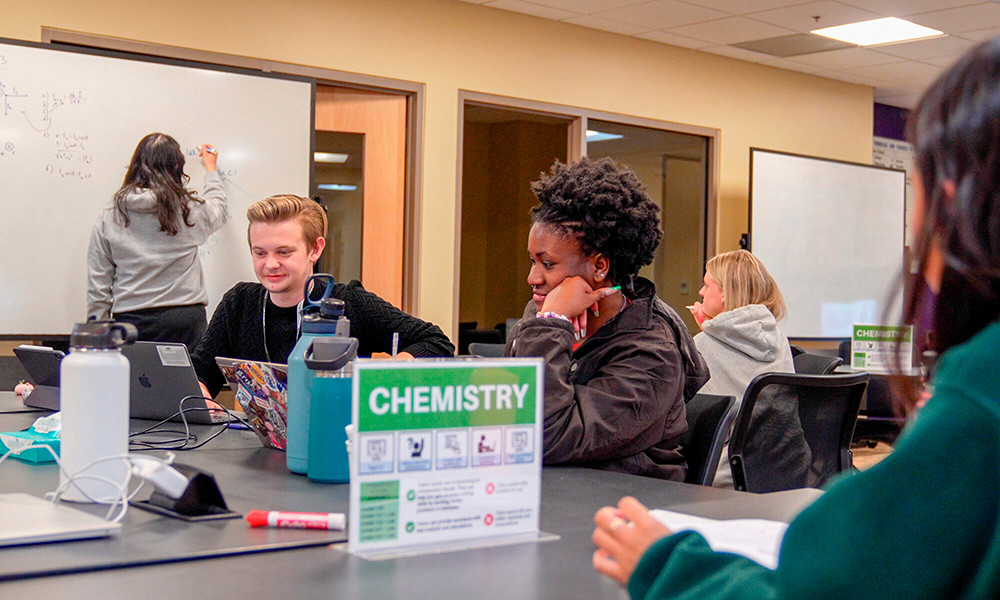JMU Learning Centers help ensure academic success
Featured StoriesSUMMARY: Academic struggles can happen at any point in a college student’s career. The Learning Centers encourage everyone to consider its mission, and support fellow Dukes through peer assistance and teamwork.
This article and other exclusive content is available in the Madison app. ![]()
Academic struggles can happen at any point in a college student’s career, from a General Education course to a requirement within their major to a research project in graduate school.
Fortunately, JMU offers a wealth of resources to help students succeed in their studies. The Learning Centers offer free online and in-person tutoring services from expert faculty members as well as qualified graduate and undergraduate students with a passion for supporting their peers.
JMU’s institutional commitment to ensuring students’ academic success dates to 1974, when Madison College began offering tutoring in various subjects to support learning and student retention.JMU established the Learning Resource Centers in 2005 to solidify various academic needs, including mentoring and disability services. In 2009, the Learning Centers transformed into an academic unit that is now home to five programs: the Communication Center, Multilingual Student Services, Peer Assisted Study Sessions (PASS), the Science and Math Learning Center, and the University Writing Center.
|
“My goal is to create a very inclusive, welcoming space that students feel comfortable coming to, where they feel represented, where they are able to do their best work and where we can help them move to the next level.” — Laura Miller, executive director, JMU Learning Centers |
Laura Miller, executive director of the Learning Centers, said faculty and peer instructors enjoy seeing students’ “aha!” moments as they begin to grasp a topic that was previously challenging for them.
“I think the peer-to-peer magic is real,” Miller said. “And often students can really understand something better when they are talking about it with a peer.”
The Learning Centers are focused on personalized instruction, academic examination and student development. Their mission of fostering an inclusive atmosphere, valuing professionalism and providing productive collaboration is what makes these programs mutually beneficial. Students working as consultants gain valuable work experience in a collaborative environment.
“My goal is to create a very inclusive, welcoming space that students feel comfortable coming to, where they feel represented, where they are able to do their best work and where we can help them move to the next level,” Miller said.
Communication Center
Communication is a skill in which all JMU students must demonstrate proficiency. Whether a student is anxious about a public-speaking assignment, needs feedback on a presentation or is seeking to ace their next job interview, the Communication Center is here to help.
Paul Mabrey (’17Ph.D.), the center’s coordinator, is committed to fostering an environment where students become familiar with communication practices.
“We really strive to be a welcoming, inclusive space where people can experiment — where they can make mistakes — as they try to develop themselves as better public speakers and better advocates,” Mabrey said.
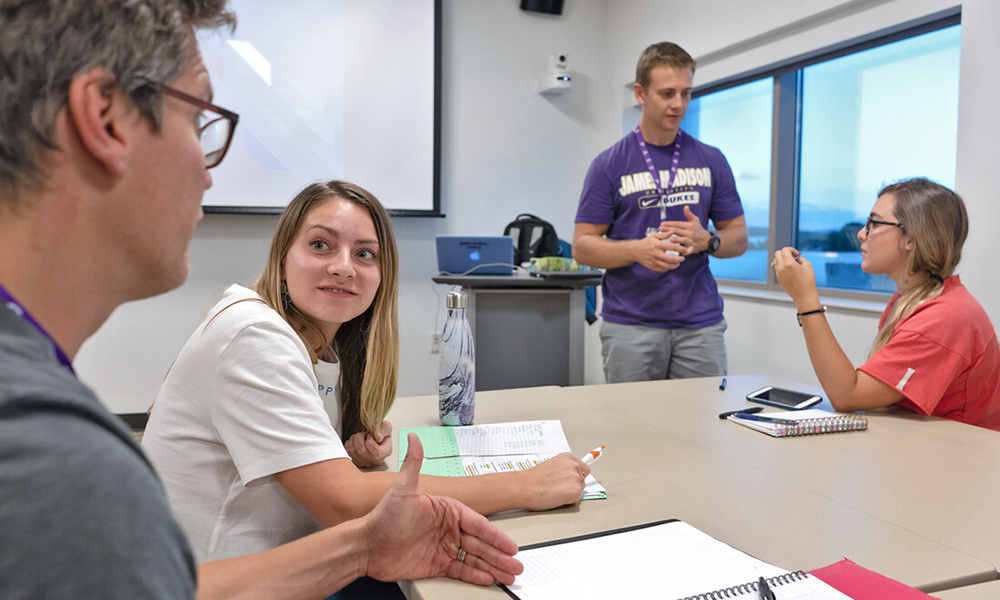
Photograph by Elise Trissel
The Communication Center offers one-on-one appointments designed to help students with speeches, research, brainstorming, interviews, confidence, exams and more.
And because good communication is crucial across almost every field of study, the center is available to all JMU students, regardless of major.
“You’ll gain a lot of insight about your assignment that you’re here for, but also about yourself, as a communicator and a public speaker,” Mabrey said. “And my guess is that you’ll have a lot of fun in the process.”
Thousands of students use the Communication Center each year, and most of them report a positive experience. “We often have students who will come back regularly, who say, ‘Wow, I had no idea that the Communication Center would be so helpful,’” Mabrey said.
“I would say to any student who’s hesitant about coming to the Communication Center, give it a shot,” he said. “Our philosophy is really open.”
Multilingual Student Services
Multilingual Student Services offers tutoring and workshops to help multilingual students improve their proficiency using academic English. MSS also works with faculty to support multilingual students in their classes.
Because multilingual students bring unique, enriching perspectives to the JMU community, MSS coordinator Kristen Kelley (’01) believes in amplifying multilingual voices on campus by advocating for more inclusive policies.
“JMU believes in diversity. We believe in inclusion. We have a strong mission that is designed to enhance the education of every student here,” Kelley said. “For multilingual students to have a place to identify with and support the experiences they’re having, it helps them to integrate more fully.”
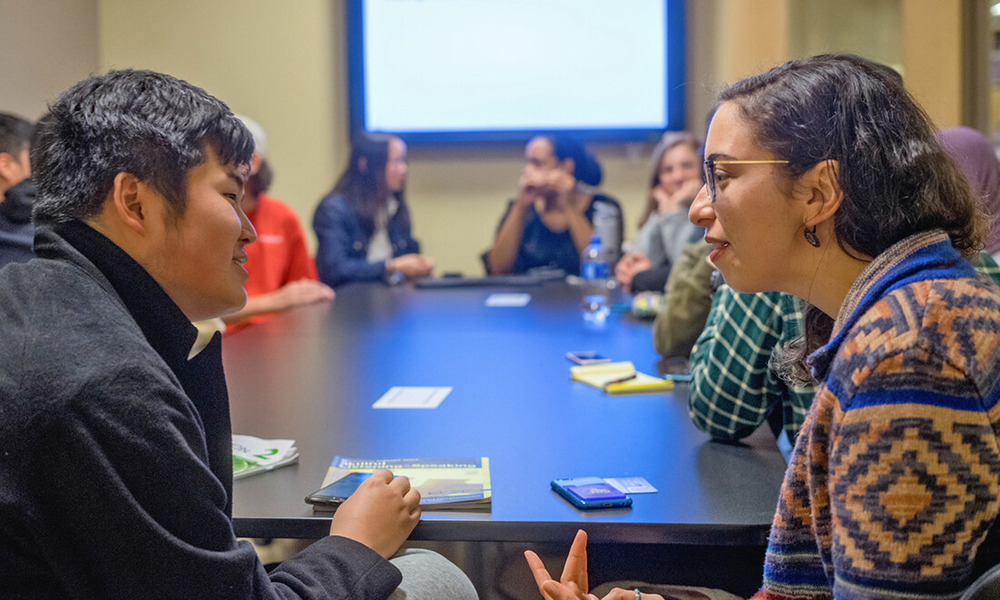
Photograph by Elise Trissel
Since its founding in 2007, MSS’s offerings have expanded to cater to students’ needs. Kelley discovered that multilingual students want a place to connect and build their academic skills in a collaborative way that doesn’t require additional work. Recently, MSS added a live, online chat box to complement existing one-on-one appointments.
For these students, Kelley believes no question is too small or too big. “Students are learning how to talk about their education in a new way because they’re not just being given the English language around this, but they’re also being supported in thinking about their learning.”
Faculty and peer educators in MSS are highly trained resource experts who are equipped to help multilingual students at JMU achieve their academic goals.
Science and Math Learning Center
Before coming to the Science and Math Learning Center, Carter Diamond, a Business Management major, failed his first Introduction to Calculus exam. He started going to the center a couple times a week, and on his next exam he scored an 86.
“I was shocked,” Diamond said. “I was ecstatic. My parents were ecstatic.”
During the peak of the COVID-19 pandemic, Diamond didn’t receive the same extensive instruction online that he had in-person. College math proved especially difficult.
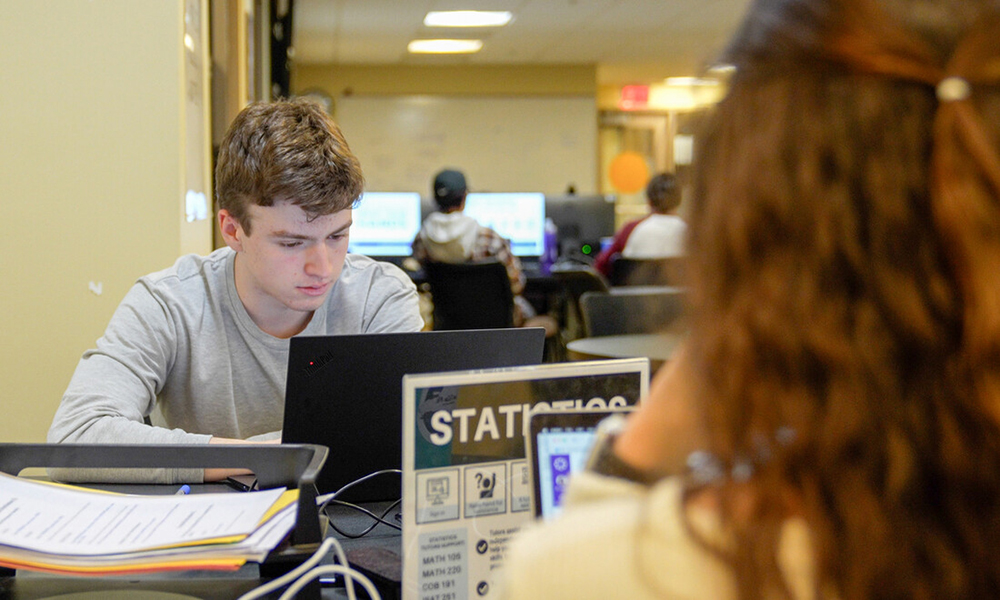
Diamond’s tutor emphasized that he needed to learn more than just the formulas; he needed to understand the deeper meaning of the course material. “Because of him, I understand it and — I don’t want to admit it — but I’m starting to enjoy it,” Diamond said.
“The learning center was probably the greatest resource I’ve used this semester,” he said. “Everything it brought me has been positive.”
SMLC aids students who need help understanding homework, labs and other coursework in first- and second-year courses in math, statistics, physics and chemistry. The center is a judgment-free zone, according to Mary Tam, interim associate director.
“Every student has a question. Every student — no matter if they’re the A student or B student — they still have gaps in their knowledge,” Tam said. “We’re here for all students no matter where they are on their journey.”
|
“The learning center was probably the greatest resource I’ve used this semester. Everything it brought me has been positive.” — Carter Diamond, Business Management major |
University Writing Center
The University Writing Center helps students develop writing and critical thinking skills, from their first college essay to doctoral dissertations.
“We do want to help folks improve their grade in a course or one particular piece of writing, but we also want them to feel empowered to write in different contexts and feel like they’re learning,” said Rudy Barrett, Writing Center specialist.
Barrett has been working for the Writing Center for more than a decade. He first became a Writing Center tutor in his second year at JMU. He said he didn’t know much about tutoring but decided to give it a try, and it ended up being one of the only jobs he ever had.
“I quickly fell in love with the sort of collaborative structure of working with people in their writing,” Barrett said.
Although Barrett never went to the Writing Center looking for assistance on an assignment, he found that his work environment as a tutor was a joint effort. He said the staff and fellow student mentors lean on each other when they need help approaching new types of writing or handling difficult sessions. “I’ve always felt really, super well-supported here. And I think that’s just part of the ethos that translates now into how I work with students,” Barrett said.
The center offers aid during every stage of the writing process, from brainstorming to final edits.
Peer educators
The Learning Centers have grown from employing only faculty to hiring more than 150 student employees, or peer educators. Students who work in the Learning Centers gain valuable work experience that allows them to give back to the Madison community. Peer educators use their subject knowledge and problem-solving skills to assist a wide variety of students.
“It’s a learning experience for me because I’m tasked with all these different scenarios, and I get to work with many different people so that no consultation is like another one that I’ve done,” said John Archibald (’22), a former writing consultant with the University Writing Center.
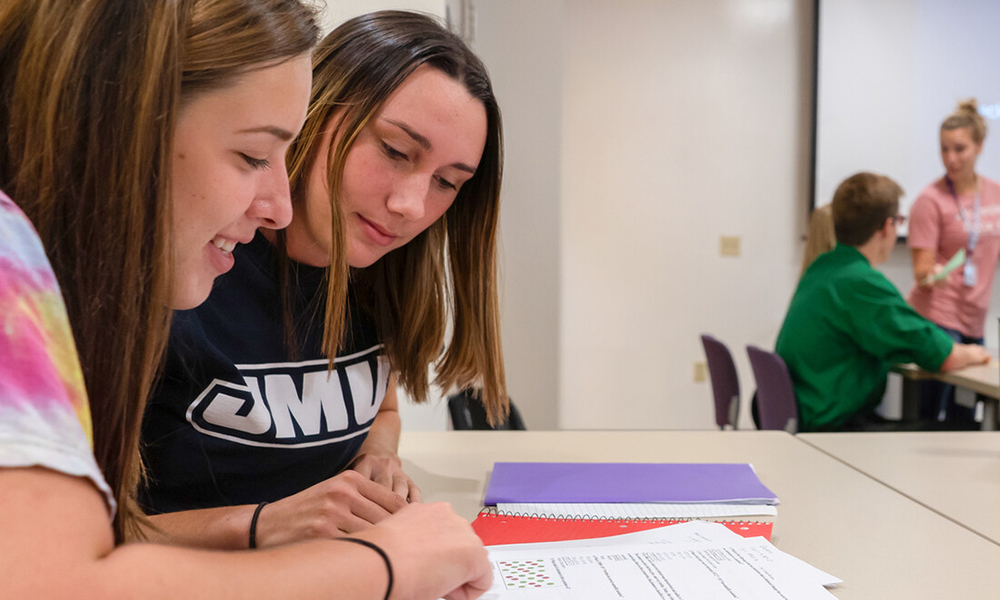
“Because of the help that I received when I was a student, I definitely wanted to pass that along and help other students as well,” said Kendal Villarreal (’22), a former tutor in the Science and Math Learning Center.
Coordinators of the Learning Centers praise the benefits that peer educators achieve through their experience. Their expertise can be applied to opportunities following college, such as graduate school and full-time employment. Several peer educators go on to pursue teaching after graduation.
“Working as a peer educator is one of the most beneficial and profound experiences that a student can have,” Mabrey said. “The act of having to develop such an expertise around an area that you can then teach and tutor someone else is one of the highest levels of cognitive awareness.”
Some peer educators are part of the Peer Assisted Study Sessions. PASS leaders have taken the same course as the students who are seeking to be tutored.
Caroline Barnes (’22) was a PASS leader during her senior year. A Liberal Studies major and Elementary Education minor, she oversaw other PASS leaders and led two math classes. Barnes and PASS leaders work closely with the professor of the course and attend the lectures so they can get to know students in the class and hold their own study sessions.
|
“It’s a moment where you don’t feel like you’re alone. In your struggle, you meet students who are in the exact same position as you. And you meet a student who was once in your position who was leading the PASS session.” — Caroline Barnes (’22) |
“It’s a moment where you don’t feel like you’re alone,” Barnes said. “In your struggle, you meet students who are in the exact same position as you. And you meet a student who was once in your position who was leading the PASS session.”
In her last semester at JMU, she observed PASS leaders working to provide feedback on how to improve their sessions. “I just can’t stress enough how much the PASS program has impacted my life,” Barnes said. “I will be forever changed.”
Located on the first floor of the Student Success Center, and available by appointment or walk-in, the Learning Centers welcome visitors who want to check out the facility and receive tutoring. They encourage everyone to consider their mission and support fellow Dukes through peer assistance and teamwork.
“That’s one of the most incredible qualities that JMU has — all of these free tutoring services,” Barnes said.

